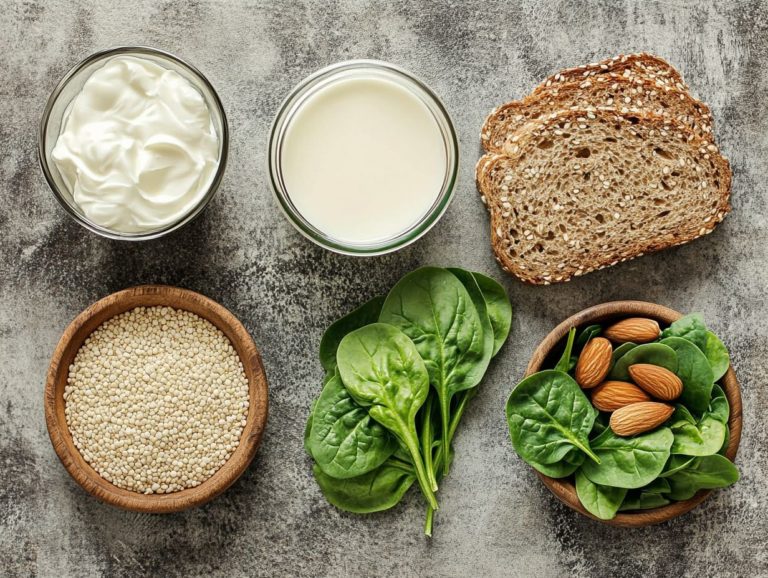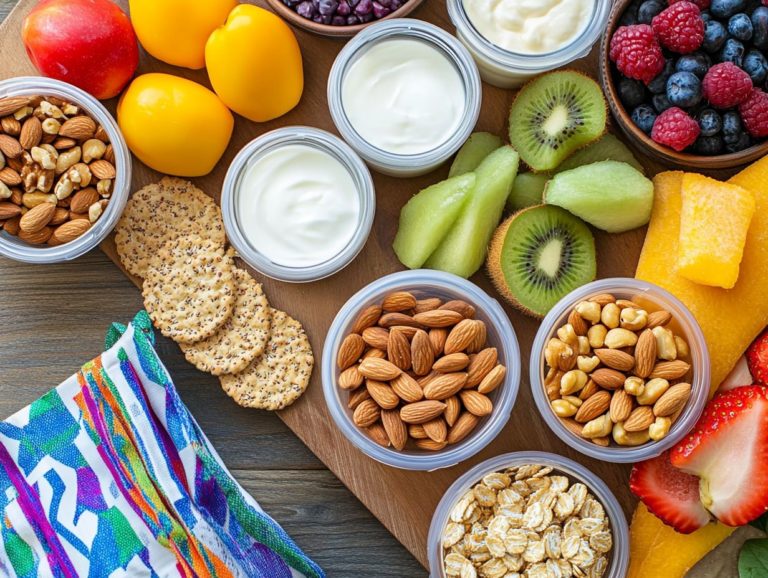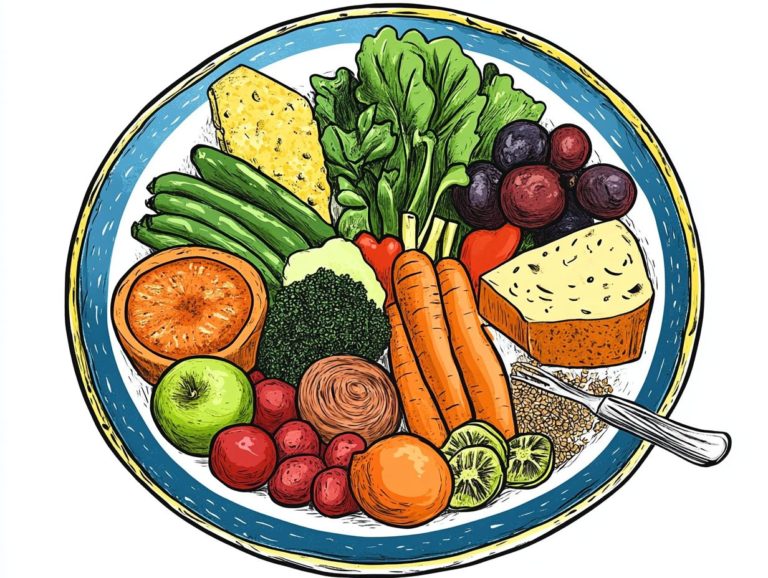How to Transition to a Plant-Based Diet
Curious about embracing a plant-based diet? This article delves into the essentials, helping you understand what a plant-based diet truly entails and its many health and environmental benefits.
You ll find a step-by-step guide for a smooth transition, tackling common challenges like cravings and navigating social situations. Practical tips for meal planning and finding support are also included to enhance your journey.
Whether you re contemplating a complete lifestyle change or simply wish to add more plant-based meals to your routine, this guide equips you with the necessary tools and insights for your success!
Contents
- Key Takeaways:
- Benefits of a Plant-Based Diet
- How to Transition to a Plant-Based Diet
- Common Challenges and How to Overcome Them
- Tips for Maintaining a Plant-Based Diet
- Preguntas Frecuentes
- 1. C mo puedo comenzar a hacer la transici n a una dieta basada en plantas?
- 2. Es necesario eliminar completamente todos los productos animales de mi dieta?
- 3. Voy a obtener suficiente prote na en una dieta basada en plantas?
- 4. C mo puedo lidiar con los antojos de alimentos que no son de origen vegetal?
- 5. C mo puedo asegurarme de que estoy obteniendo todos los nutrientes necesarios en una dieta basada en plantas?
- 6. C mo manejo las situaciones sociales mientras hago la transici n a una dieta basada en plantas?
Key Takeaways:

Switching to a plant-based diet boosts your health and helps the environment. To learn more about the process, check out this guide on how to transition to a plant-based diet. Start gradually by adding plant-based meals and seeking support from others.
What is a Plant-Based Diet?
A plant-based diet primarily consists of foods derived from plants, such as vegetables, fruits, beans, lentils, whole grains, nuts, seeds, and plant-based protein sources like tofu and tempeh. By minimizing your intake of meat and processed foods, you can focus on whole-food options that provide a rich array of nutrients and health benefits, making this diet an appealing choice for anyone wanting to live healthier.
This lifestyle offers different eating patterns, including veganism, which excludes all animal products, and flexitarianism, which allows for occasional meat consumption.
Each variation comes with unique nutritional benefits, rich in fiber, essential vitamins, and minerals. For instance, beans and lentils are fantastic sources of protein and fiber, while leafy greens provide vital iron and calcium.
The diverse array of nutrients found in a plant-based diet not only supports your overall health by boosting your immune system but also reduces the risk of chronic diseases, making it an excellent option for maintaining vitality and well-being.
Benefits of a Plant-Based Diet
Embracing a plant-based diet presents numerous health benefits, especially when it comes to lowering the risk of chronic diseases like Type 2 diabetes, heart disease, and certain cancers. This approach not only enhances your overall well-being but also helps reduce inflammation.
Reputable sources like the Mayo Clinic and Harvard Health Blog stress the importance of plant foods in your diet, as they are crucial for maintaining healthy cholesterol levels.
Health and Environmental Benefits
The health and environmental benefits of a plant-based diet are truly remarkable. By embracing this way of eating, you enhance your nutrition through a variety of plant foods brimming with energy and nutrients while also contributing positively to reducing the environmental impacts linked to meat production.
This choice encourages you to cut back on processed foods while fostering sustainable eating habits, making it a perfect fit for those who care about the planet.
Research shows that adopting a plant-based diet can significantly lower your risk of obesity and chronic diseases. For example, studies reveal that individuals who embraced plant-based eating had a notably lower body mass index (BMI) compared to their meat-eating peers.
The ecological impact is hard to ignore; livestock farming accounts for around 14.5% of global greenhouse gas emissions, exacerbating climate change. By opting for plants over meat, you boost your own health and play an essential role in protecting the planet.
In this way, the benefits of a plant-based diet ripple outward, positively impacting both your well-being and the environment.
Ready to make the switch? Start today and let’s dive into your plant-based journey together!
How to Transition to a Plant-Based Diet

Transitioning to a plant-based diet is a rewarding journey. It offers many health benefits.
A flexitarian approach allows for occasional meat while focusing on plant foods. This gradual shift opens up a world of cooking adventures and provides opportunities for meal preparation.
You’ll find it easier to discover delicious recipes and connect with a supportive community that shares your dietary goals.
Step-by-Step Guide
A step-by-step guide to transitioning to a plant-based diet offers practical strategies. Think meal prep, experimenting with various recipes, and seeking nutrition support from registered dietitians or community groups focused on plant-based eating.
Meal preparation lays a solid foundation for your transition. Consider dedicating a few hours each week to batch-cook grains, beans, and chopped vegetables. This ensures nutritious ingredients are readily available for quick, satisfying meals.
Explore diverse cooking techniques like steaming, roasting, or stir-frying to elevate the flavors and textures of your dishes. This makes plant-based meals irresistibly appealing.
For recipe inspiration, dive into online communities or cookbooks dedicated to plant-based cuisine. You’ll find innovative ways to integrate seasonal vegetables into your meals.
Connecting with registered dietitians can also be a game-changer. They offer personalized advice tailored to your nutritional needs, easing your shift toward a healthier lifestyle.
Common Challenges and How to Overcome Them
Embracing a plant-based diet can be exciting, but it does come with challenges! You might face cravings for meat or navigate social gatherings where plant-based options are scarce.
However, with the right support and active community engagement, you must tackle these hurdles head-on! Recognizing potential obstacles enables you to develop strategies that enhance your dietary choices and enrich your social experiences.
Dealing with Cravings and Social Situations
Cravings for meat and social situations can indeed be a challenge. However, with creative meal prep and a repertoire of delicious plant-based recipes, you can satisfy those cravings and make social engagements enjoyable.
Incorporating diverse ingredients and bold flavors allows you to craft satisfying dishes that mimic the texture and taste of meat. Experiment with legumes, mushrooms, and an array of spices to unlock a world of culinary possibilities.
Meal prepping can streamline your daily routine. Consider batch-cooking a hearty lentil stew or marinating tofu to enjoy throughout the week.
When socializing, bring a vibrant plant-based dish like a quinoa salad or a spicy chickpea wrap. This demonstrates how enjoyable a plant-based lifestyle can be, fostering shared experiences that strengthen connections while staying true to your dietary choices.
Tips for Maintaining a Plant-Based Diet

Maintaining a plant-based diet demands careful meal planning and a readiness to explore innovative recipes. The encouragement of a community that shares your dietary goals enhances your journey toward embracing this nutritious lifestyle.
This support fosters motivation and helps you succeed. Start your plant-based adventure now and discover a healthier, tastier lifestyle!
Meal Planning and Finding Support
Effective meal planning is essential for a thriving plant-based diet. Get involved in community groups and online forums to access practical cooking ideas and nutritional advice.
To excel on this path, try different meal planning methods. Cooking large amounts at once and crafting a simple weekly menu can make grocery shopping easier.
Local community centers often offer cooking classes or workshops. This is a great way to connect with fellow plant-based enthusiasts and share experiences.
Online platforms like Pinterest and specialized recipe sites provide a wealth of plant-based recipes for various tastes and occasions. Nutrition-focused websites can also help ensure you meet your nutrient needs while following this lifestyle.
By using these resources, you can cultivate a vibrant and sustainable plant-based life.
Preguntas Frecuentes
1. C mo puedo comenzar a hacer la transici n a una dieta basada en plantas?
Para comenzar, agrega poco a poco m s comidas basadas en plantas a tu dieta. Incorpora m s verduras, frutas, legumbres y granos enteros.
Reducir la carne y productos l cteos gradualmente tambi n puede facilitar la transici n.
2. Es necesario eliminar completamente todos los productos animales de mi dieta?

No necesariamente. Cada persona tiene su propio viaje hacia una dieta basada en plantas.
Algunos pueden elegir eliminar los productos animales, mientras que otros pueden consumirlos en moderaci n. Encuentra el equilibrio que funcione para ti.
3. Voy a obtener suficiente prote na en una dieta basada en plantas?
S , puedes obtener suficiente prote na de alimentos como frijoles, lentejas, tofu y tempeh. Incluye una variedad de estos alimentos en tus comidas.
4. C mo puedo lidiar con los antojos de alimentos que no son de origen vegetal?
Los antojos son comunes al hacer la transici n. Encuentra alternativas vegetales para tus favoritos, como una hamburguesa de frijoles negros.
Recuerda tambi n por qu elegiste hacer este cambio.
5. C mo puedo asegurarme de que estoy obteniendo todos los nutrientes necesarios en una dieta basada en plantas?
Come una variedad de alimentos enteros y basados en plantas, incluyendo frutas, verduras, granos, legumbres, nueces y semillas.
Considera un multivitam nico o consulta a un dietista registrado para asegurarte de satisfacer tus necesidades nutricionales.
Las situaciones sociales pueden ser desafiantes. Lleva un plato basado en plantas a las reuniones y comunica tus restricciones a amigos y familiares.
Es importante recordar que est bien mantener tus elecciones, incluso si otros no las comprenden.






